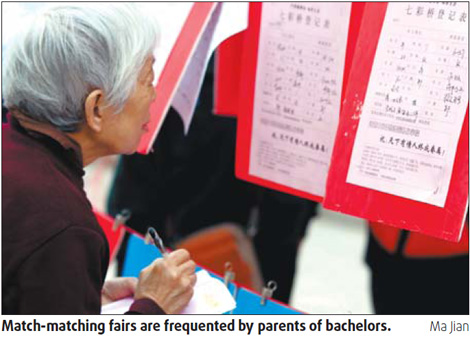
While the feudal times of forced marriages are history, many office workers today are not opposed to having their parents find their life partners, according to an annual survey by Baihe.com, a marriage counseling website.
Its 2009 report is based on interviews with, and online questionnaires answered by, the website's two million members, mostly bachelors aged between 19 and 40, with an average age of around 30.
Nearly 47 percent of the respondents said they found it embarrassing and unacceptable to entrust their parents with hunting for their spouse. But 40 percent, either firmly or implicitly, consented to their parents registering them at matchmaking agencies, selecting blind dates and arranging the time and place of their dates.
"People are too busy with work and have little time to extend their social network. More than half the respondents said they may at best find one person in a whole year, with whom they could develop a serious relationship," says Tian Fanjiang, CEO of Baihe.com.
"Meanwhile, they find it much better to keep their parents occupied with something they are keen on, rather than have them nag all day long."
Some people who have been raised to be obedient and quiet, simply trust their parents' choices, Tian adds. They believe if they marry someone chosen by their parents, there will be fewer conflicts between their spouses and parents.
Researchers say such a dependence on parents may indicate a lack of confidence in oneself and an inability to mix freely with the opposite sex.
The survey also showed that unmarried women feel societal pressure for marriage more acutely than men, with 41.2 percent of unmarried women saying they worry they may not find a spouse, as opposed to just 8.1 percent for men. At the same time, 44.1 percent of the women respondents held fast to their requirements of their spouse.
Nearly 60 percent of the respondents said they would prepare carefully in order to leave their blind dates with a good impression. Of the remaining, 34.7 percent said they would change into a fresh set of clothes, while 5.5 percent said they would do nothing.
Nearly 60 percent said they would give up if they got the feeling they would be turned down by their dates, and only 32 percent said they would give it another try.
The survey also showed that morals and a pleasant personality rank high among bachelors' expectations of their partners. But men and women differed noticeably in their second and third most-important criteria. Men care more for commitment to the relationship (46.4 percent) and appearance (43.6 percent), while women attach great importance to earnings (44.1percent) and capability (42.5 percent).
"The figures partly explain why women with high education, high incomes and high positions, and men lacking in these three aspects, become 'sheng nu' and 'sheng nan' (single women and men)," says Fan Aiguo, secretary of the China Association of Marriage and Family.
"They also indicate the dilemma faced by people caught in social transformation - pursuing love on one hand and material pursuits on the other," she says.